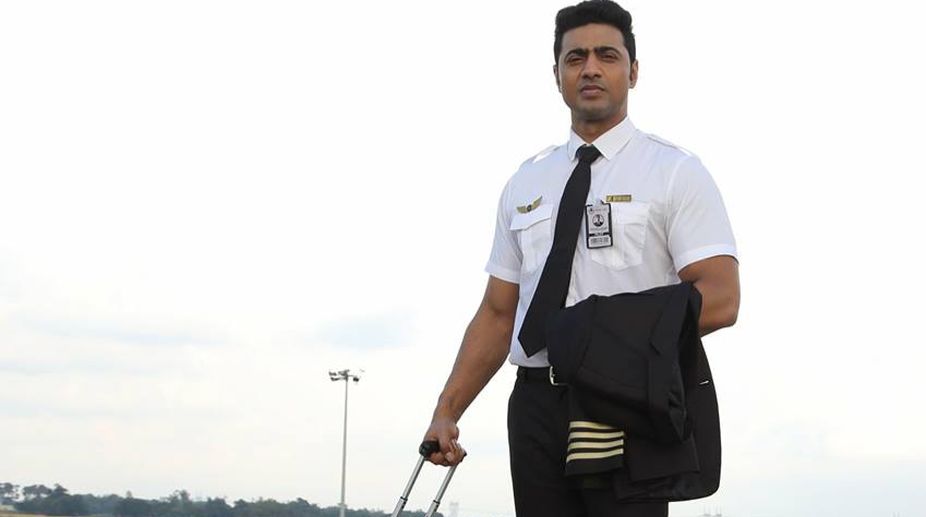Fardeen Khan celebrates 20 years of ‘Dev,’ thanks Kareena for role
Fardeen Khan celebrates 20 years of 'Dev,' expressing gratitude to Kareena Kapoor for recommending him for the role and reflecting on working with Amitabh Bachchan.

Dev (Photo: Facebook)
One cannot blame an actor who has tasted as much success as Dev so early in his career to be on the lookout for an image makeover when the going hasn’t been up to expectations. He had to look for ways in which to broaden his base or extend his popularity to discerning viewers.
To begin with, he walked into films outside the formula with directors Aniruddha Roy Chowdhury, Aparna Sen and Srijit Mukherjee. These were driven by scripts rather than the screen personality that had fetched him handsome rewards in blockbusters like Paglu and Romeo.
Advertisement
Moving from popular rituals to more meaningful appearances was one way of reinventing himself in the way actors like Amitabh Bachchan and Uttam Kumar had proved their credentials though the stars of yesteryear had made natural adjustments rather than conscious shifts in their assignments. Both stalwarts of the past were striking examples of success through the combined impact of art and entertainment. Uttam Kumar was conferred the national award for best actor in 1967 — the year in which the award was instituted — for his performances in Chiriyakhana and Antony Firingee. The two films were poles apart. The same was true of Amitabh Bachchan.
Advertisement
He had excelled in the films of Hrishikesh Mukherjee around the same time that he had scaled phenomenal heights with the image of the “angry young man” in Zanjeer though, for all practical purposes, the character went on to produce stereotyped expressions, which were lapped up by the masses. Clearly, he was also capable of the complex reactions of credible characters. With an instinctive response to the challenges of the roles and the demands of the camera, Uttam and Amitabh lived up to a wide range of expectations.
That is what has kept their skills alive as well as the memories of their work alive. During their best years, the cinema itself was divided between the popular and parallel streams with films by directors like Hrishikesh Mukherjee in Mumbai and Tapan Sinha in Bengal existing somewhere in between. Bachchan left a resounding impression in Anand, Abhimaan, Chupke Chupke while Uttam Kumar is unforgettable in Jatugriha.
There was no question of shedding one image to embrace another — it was a natural transition in every case. This has become more difficult in the present scenario when the lines between art and entertainment have been blurred to the point of being extinguished. It makes the task of an actor like Dev all the more difficult. He had stuck to popular heroics for many years as that was his most fertile ground. Like many of his counterparts in Bollywood who have branched out into unconventional roles where they may not be a hint of romance, Dev may have observed a pronounced shift away from colourful fantasy.
The choice is thus to make adjustments in the screen personality that would give him more interesting options. However, the unconventional themes that Dev has embraced over the last few years haven’t worked to the extent he may have desired. The exception was Chander Pahar, which was an exceptional tale of adventure in Africa — virgin territory as far as Bengali cinema was concerned. In order to keep that experience alive, he has ventured into the Amazon in one of his future projects in the hope that audiences will be gripped by the same excitement.
But with bigger ideas up his sleeve, Dev has moved into a new phase as producer of films where he plays characters that have seldom, if ever, been seen on the screen in Bengal. The trend began with Chaampwhere he was a boxer desperately trying to rise above adversity. In his latest film, Cockpit, he plays a pilot who steers an aircraft out of danger after it has run into a technical snag. Predictably, both films reserve the maximum space for the actor-producer. While the characters haven’t been on the radar of production houses which have their own calculations of what the masses want, Dev has taken the risk of mixing a popular image with a departure from the song and dance concoctions made worse by ritualised display of muscle power.
Much of the adventure in Cockpit is set inside the aircraft which, in itself, should generate unusual excitement as far as a Bengali film is concerned. The director, Kamaleswar Mukherjee, has distinguished himself with his directorial skills and had struck a promising partnership in their first film together.
Cockpit makes another attempt to move away from the beaten track and some of the visual experience is quite extraordinary. However, there are concessions to popular taste where the in-flight adventure includes a tender recollection of an aborted relationship. The jump cuts allow the hero to court a beautiful stewardess on exciting locations before he flies into the arms of another woman.
All this is part of the dilemma of offering something different to the audience while preserving the macho excesses of the protagonist who must eventually emerge triumphant. The film does nothing to extend the credentials of either the director or the actor.
They may have been better advised to look at a subject that was more sensible and leave it to the audience — even if it wasn’t as lavishly mounted as Cockpit.
Advertisement